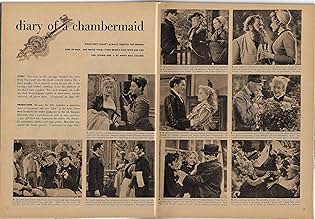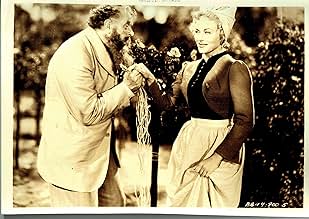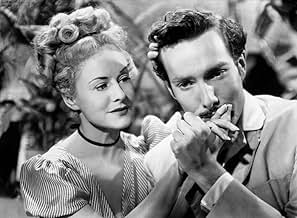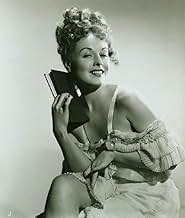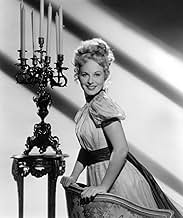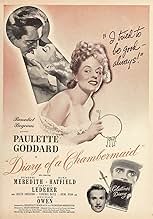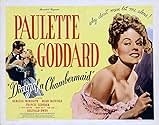CALIFICACIÓN DE IMDb
6.5/10
1.6 k
TU CALIFICACIÓN
Agrega una trama en tu idiomaA chambermaid plots to climb the social ladder by marrying a wealthy man.A chambermaid plots to climb the social ladder by marrying a wealthy man.A chambermaid plots to climb the social ladder by marrying a wealthy man.
- Dirección
- Guionistas
- Elenco
- Premios
- 1 premio ganado en total
Edward Astran
- Townsman
- (sin créditos)
Arthur Berkeley
- Townsman
- (sin créditos)
Chet Brandenburg
- Townsman
- (sin créditos)
Egon Brecher
- The Postman
- (sin créditos)
Jane Crowley
- Townswoman
- (sin créditos)
Sumner Getchell
- Pierre
- (sin créditos)
Jack Perry
- Townsman
- (sin créditos)
Joe Ploski
- Townsman
- (sin créditos)
Opiniones destacadas
"Life is life. From now on I'm going to fight, and I'm going to fight hard, and I don't care who gets hurt, just so as it's not me."
"Don't be afraid of me. You and I are alike, maybe not in looks, but underneath we are the same."
"How does it feel to be in love?
"Plans can get you into trouble."
"We are not used to kissing in public.
"Where are you going?
"The more I'm beaten, the stronger I get."
"Don't be afraid of me. You and I are alike, maybe not in looks, but underneath we are the same."
"How does it feel to be in love?
- It changes all the time."
"Plans can get you into trouble."
"We are not used to kissing in public.
- Not in public. Are you ashamed? You shouldn't be ashamed of love. You should be proud. Take him in your arms, hold him, kiss him, embrace him!"
"Where are you going?
- Flying to the moon." 😂
"The more I'm beaten, the stronger I get."
Octave Mirbeau's brilliant, chilling novel was written more than 100 years ago, but its sordid, sexy, near-surrealistic mood and story could not possibly be given a worthy treatment in 1946, and certainly not in an America still subject to the Hays code. This film takes only some of the incidents in the episodic novel and tries to make the story into an eccentric romantic comedy. But, minus the mood and ambiance of the novel, the result is awkward and odd. An important aspect of the novel, anti-semitism (the book was written when France was torn apart by the Dreyfus case) is completely left out, and, instead of perversion and cruelty, Celestine experiences, from her employers, only annoyance. The performances are lightweight, except for Francis Lederer (always good at gentlemanly brutes) as the sinister valet. The film's only moments of horror occur when he indulges his talent, and taste, for discreet violence.
Nothing the great Renoir directed is without interest, and this Diary certainly has moments of beauty and affectionate comedy. But a much more accurate adaptation was Bunuel's in 1964. He left in the anti- semitism, and his own sexy-sadistic-surrealistic mood was a perfect match for Mirbeau's. One moment in this story reminded me of a similar incident, one of my favourites in a Bunuel film. The family for whom the chambermaid works lives next to a peppery, eccentric old man who demonstrates his loathing for his neighbours by throwing rocks through the panes of their greenhouse. In The Exterminating Angel, the partygoers are frightened when a brick is thrown through the window. The host calms them with "It's nothing. Just a passing Jew." Priceless!
Nothing the great Renoir directed is without interest, and this Diary certainly has moments of beauty and affectionate comedy. But a much more accurate adaptation was Bunuel's in 1964. He left in the anti- semitism, and his own sexy-sadistic-surrealistic mood was a perfect match for Mirbeau's. One moment in this story reminded me of a similar incident, one of my favourites in a Bunuel film. The family for whom the chambermaid works lives next to a peppery, eccentric old man who demonstrates his loathing for his neighbours by throwing rocks through the panes of their greenhouse. In The Exterminating Angel, the partygoers are frightened when a brick is thrown through the window. The host calms them with "It's nothing. Just a passing Jew." Priceless!
The Diary of a Chambermaid (1946) was directed by the great Jean Renoir. This is an U.S. film, although the action was set in France, and directed by a French director.
The movie is set in rural France in 1885. As the title suggests, a new chambermaid has arrived at a mansion of an eccentric couple. (Actually, almost everyone in the movie is eccentric to a greater or lesser degree.)
The person who's not eccentric, but totally evil, is the valet, Joseph. Francis Lederer portrayed Joseph, who is evil to the core. He looks like the villain that he is. (Actually, in one film. he played Count Dracula).
The reason to see is film is to watch Paulette Goddard at work. She was the classic Hollywood beauty of her time. And, 70 years later, she is still a classic Hollywood beauty. Better than that, she could act! Goddard plays Célestine, the chambermaid, whose only path out of lower-class drudgery is to marry a rich man. How this plays out is the plot of the film.
Renoir was possibly the greatest film director of the 20th Century. However, this movie is one of his minor films. Renoir does crowd scenes well, but he can't take his eyes off Goddard, and neither can we.
This movie has an anemic IMDB rating of 6.7. It's not a great film, but I think it's better than that. We saw it on DVD, and it worked well enough. Be sure to see it if you're a Renoir fan or a Goddard fan. Otherwise, I'd suggest Buñuel's 1964 version, with Jeanne Moreau.
The movie is set in rural France in 1885. As the title suggests, a new chambermaid has arrived at a mansion of an eccentric couple. (Actually, almost everyone in the movie is eccentric to a greater or lesser degree.)
The person who's not eccentric, but totally evil, is the valet, Joseph. Francis Lederer portrayed Joseph, who is evil to the core. He looks like the villain that he is. (Actually, in one film. he played Count Dracula).
The reason to see is film is to watch Paulette Goddard at work. She was the classic Hollywood beauty of her time. And, 70 years later, she is still a classic Hollywood beauty. Better than that, she could act! Goddard plays Célestine, the chambermaid, whose only path out of lower-class drudgery is to marry a rich man. How this plays out is the plot of the film.
Renoir was possibly the greatest film director of the 20th Century. However, this movie is one of his minor films. Renoir does crowd scenes well, but he can't take his eyes off Goddard, and neither can we.
This movie has an anemic IMDB rating of 6.7. It's not a great film, but I think it's better than that. We saw it on DVD, and it worked well enough. Be sure to see it if you're a Renoir fan or a Goddard fan. Otherwise, I'd suggest Buñuel's 1964 version, with Jeanne Moreau.
Chambermaid Paulette Goddard (Celestine) and the feeble, irritating Irene Ryan (Louise) arrive at the stately home in which they are to serve. They first meet the rather unpleasant valet, Frances Lederer (Joseph) before being introduced to Reginald Owen (Captain Lanlaire) and his wife Judith Anderson (Madame Lanlaire), who have an ill son, Hurd Hatfield (George). It becomes clear that it is Goddard's role to make his life better. Can she succeed....?
Paulette Goddard, Frances Lederer and Judith Anderson carry the film in terms of having a good cast but I'm afraid that's it. The film suffers by having too many buffoons - virtually everybody else. While Reginald Owen is OK as a bumbling old man, one is enough for any film. Unfortunately, we are also given Burgess Meredith as an extremely annoying old codger of a neighbour - he must be the most annoying character EVER. He constantly jumps and bounces around just like all old people do - you get my drift? He is so unconvincing that it's embarrassing. He is meant to be a likable, cheeky chappy. He isn't. Frances Lederer has a great moment with him towards the end of the film. Marvelous!
Frances Lederer keeps the tension ticking and is very watchable as the valet with something sinister going on in his head. The plot is good and keeps us watching as to how things will pan out for Goddard. Time to check the silverware.
Paulette Goddard, Frances Lederer and Judith Anderson carry the film in terms of having a good cast but I'm afraid that's it. The film suffers by having too many buffoons - virtually everybody else. While Reginald Owen is OK as a bumbling old man, one is enough for any film. Unfortunately, we are also given Burgess Meredith as an extremely annoying old codger of a neighbour - he must be the most annoying character EVER. He constantly jumps and bounces around just like all old people do - you get my drift? He is so unconvincing that it's embarrassing. He is meant to be a likable, cheeky chappy. He isn't. Frances Lederer has a great moment with him towards the end of the film. Marvelous!
Frances Lederer keeps the tension ticking and is very watchable as the valet with something sinister going on in his head. The plot is good and keeps us watching as to how things will pan out for Goddard. Time to check the silverware.
The Diary of a Chambermaid is a transitional film in the development of Renoir's lesser known stylistic system. Braudy would later distinguish Renoir's two systems as being tied to theater and realism respectively (although there have been compelling arguments about these categories being either reductive or simply misnomers). Goddard is the focus of the story (much in the same way Renoir later uses Magnani, Arnoul and Bergman). The camera tracks her action, her closeups are one-shot, there are alternating shot scales in single scenes to emphasize her character's psychological reaction to events, studio exteriors help idealize the framing of her screen personality and high/low angle shots purvey her psychological perspective on group dynamics. Celestine (Goddard) has an ambiguity to her motivation that heightens psychological identification. It is unclear as to whether she sees the world divided into classes or sexes, or both. The ending is a happy one, and the politics is further subverted through jovial and emotionally-charged highly-individualized characters. Non-diegetic soundtrack is employed to increase distinctions in the emotional responses of different characters. Depth of field is at the service of Celestine's staging while obstructions in the mise-en-scene become incorporated into the plot. In this respect, the camera is not an unobtrusive one. There is an inconsistency in the use of stylistics, where on one hand reframing pans are fully at the service of psychological identification and privilege of the transcendental subject position while the long take mobile framing of the July 14th celebration reminisce on M.Lange, Illusion and Regle. Diary is a melodrama with comedic elements to take the edges off, but when the master of the house reads in the morning paper "another woman murdered in Paris, another woman cut to pieces" there is no doubt that Renoir is infusing a consideration for the plight of women in a misogynist society. This was very important to him and perhaps the dark undertones of this film have something to say about the repression he experienced working in Hollywood for the war. How Burgess Meredith factors into all that remains to be seen.
¿Sabías que…?
- TriviaIt is sometimes said that this was the only film Jean Renoir made entirely inside a studio.
- ErroresWhen the Captain (Meredith) is going to the July 14 celebration, the shadow of the boom and mic are visible.
- Citas
Georges Lanlaire: I never found the urge to live or die on a big scale.
- ConexionesReferenced in Tiovivo c. 1950 (2004)
Selecciones populares
Inicia sesión para calificar y agrega a la lista de videos para obtener recomendaciones personalizadas
- How long is The Diary of a Chambermaid?Con tecnología de Alexa
Detalles
- Tiempo de ejecución1 hora 26 minutos
- Color
- Relación de aspecto
- 1.37 : 1
Contribuir a esta página
Sugiere una edición o agrega el contenido que falta

Principales brechas de datos
By what name was Memorias de una doncella (1946) officially released in India in English?
Responda
